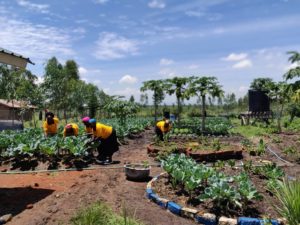 I had forgotten cold water is so cold when taking a bath in the morning.
I had forgotten cold water is so cold when taking a bath in the morning.
It had slipped my mind that the rooster will crow at all odd hours, not just at sunrise.
I missed the different smells of the rains: before they hit the scorched red earth, while it is raining, and as it moves on, leaving the land watered and complete.
I fail to recall that that a chicken will likely be sitting on my bed throughout the day and will give me a look of utter contempt when I shoo her away.
What has never escaped my memory and what forever lives in me is the sound of children laughing, the busyness of the kitchen in the morning, the mosquito buzz waking me up in the middle of the night, the croon of a pigeon, and the kindness found in the community.
We arrive after hours and hours of travel, now a group of three – Naomi, Kathy and I. We come carrying little on this day, packing simply for the three days we’ll spend in Miwani checking out the garden and sisal projects, as well as the orphanage we support. Naomi is the only one laden down and with good reason, as she carries cameras and lenses of all types, gifting us with memories for the future and recording this year’s travels. She is new to this type of travel where poverty stares at you in the face as you drive through miles and miles of dilapidated houses in search of your destination. I see things with fresh eyes as she takes in both the amazing and the dreadful. As she sees the beauty and the ashes. As her face both reflects her wonder and her sadness. I am glad she sees the wonder of this country and that she is not focused solely on the poverty which surrounds us, but I do wish I could show her a flip side – the resorts, a safari, a nice restaurant, or an elegant hotel. Instead, I introduce her to what most people refuse to step into – poverty, need, lack of choices. She enters gracefully.
We arrive to our small community and as I open the door of the car, we hear the grannies singing and clapping, welcome us home. I descend to hugs, kisses, prayers, and joy. Wrinkled faces I know so well greet me back, saying my name and kissing my cheeks. They want to know how Juju and Aiden are and ask me with hands to tell them how tall my children have grown. We all walk together to the guesthouse, clapping and swaying to their singing, a group of women brought together by love and friendship.
These are the grannies who make rope daily – twisting and turning sisal from the fields into strong, sturdy rope to be sold in the market. Their hands are calloused, strong. They laugh and talk as they work, knowing that they will be able to eat tonight thanks to wages earned from work that allows them to sit in the shade, protecting them from the blistering sun. As we approach them in the middle of the afternoon, once again, they offer prayers and hugs, explaining that without this project, they would be hungry and the children in their care would be uneducated. I wonder where the gloves I gave them are, gloves meant to protect their hands. They tried them, they say, and found them lacking, as they can’t feel the sisal fibers well enough if their hands are covered. They appreciate the effort, they say, but it is best to carry on with their bare hands. You’ve changed our lives, they say, leaving me speechless.
We walk towards the 23 garden plots bursting with kale, tomatoes, potatoes, beans, and a smattering of butternut squash. Seven women, all affected by AIDS, work this land three days a week, giving them time to be mothers and grandmothers. Proudly wearing bright yellow shirts that say GARDEN PROJECT on their back, they mulch, water, weed, prepare new land, sow, plant, harvest. I strike up a conversation with two women and ask what the project means to them and they explain that they and the children eat from the money earned. That the children are in school. That the household has seen improvements. I ask if they are paid in shillings or in vegetables and they smile, saying that their pay is in cash, daily, at the end of the workday. They do not receive vegetables from these gardens for free, as their wages are good. Instead, they can purchase any food they want, whether at market or here. Like many community members, they opt to buy veggies from here, placing orders that are fulfilled throughout the day.
With the goal of 50 plots of gardens, I ask Grace, the head gardener, to give me a list of what she would like to grow here, to dream a little. No one has asked her that before, and she smiles as she pounds garlic, ginger and onions into a natural pesticide. Amazing smells waft up from her mortar and pestle, and I wonder why bugs don’t like this mix she is making while all I want to do is fry it up and add it to some beans and rice. She promises me an answer by tomorrow, after she’s had time to think things through. Cleaning her hands on her apron, she goes through record books with me, impressing me with her eye for detail. She is a willing learner and we address some changes that will make the record-keeping a bit more complete and she promises to add the extra two columns.

